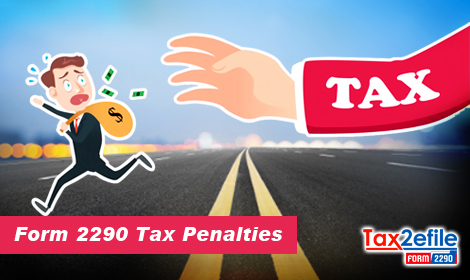- September 1, 2021

The deadline to file Form 2290 with the IRS is August 31st, 2021, for the tax year 2021-22. If the truck owners or the owners of HVUT vehicles with a taxable weight of 55,000 pounds or more, fail to file the tax Form, by the due date, then they will have to face severe penalties from the IRS. The penalties could be additional fines and interest charges on late payments, and in the worst case, the vehicle can be detained from use on the roads.
HVUT penalties from the IRS
The Internal Revenue Service levies penalties for failing to File Form 2290 and failing to pay the taxes before the due date. IRS also levies penalties for filing false returns. Interest will also be charged by the IRS on late payment of taxes, along with the penalties. However, these penalties and files for paying the tax late will not be imposed if the taxpayer can show reasonable causes for not filing the Form and paying the taxes on time.
Penalties rates from the IRS in different instances
- Failing to pay the HVUT tax by the deadline:
If the truck owners fail to file their IRS Form 2290 by the deadline, they may have to pay a penalty of up to 4.5% of the total tax amount due and the penalty can increase monthly for up to five months.
Apart from these federal penalties, some states can even suspend the registration of the vehicle for which proof of HVUT payment has not been provided.
2. Failing to pay the tax dues on time:
The penalty for failing to pay the heavy highway use tax payment will be about 0.5% of the total tax amount. The taxpayers will also face an additional interest rate of 0.54% per month.
On the basis of these calculations, the HVUT payment that was originally $550 will increase to about $700 by the end of the five months of delinquency when the taxpayers fail to file the tax.
3. Penalty Relief:
If the taxpayers can show appropriate reasons for failing to file Form 2290 or failing to pay their taxes on time, then they can request a penalty relief by explaining their reasons in a letter and mailing it to the IRS. These explanations should not be sent with the IRS Form while filing the returns.
Taxpayers can also request an extension for Form 2290, with the IRS through a letter and can mail it to the Department of the Treasury, IRS. The letter should explain the cause of the delay and this extension may not be applicable for more than six months.
Preventing penalties with Form 2290
The best route to avoid penalties levied by the IRS on Form 2290, is to e-file the Form through an IRS-authorized service provider, such as Tax2efile. By choosing to e-file the form, they can complete the entire process in less than five minutes and get their stamped copy of schedule-1 in their mail instantly.


